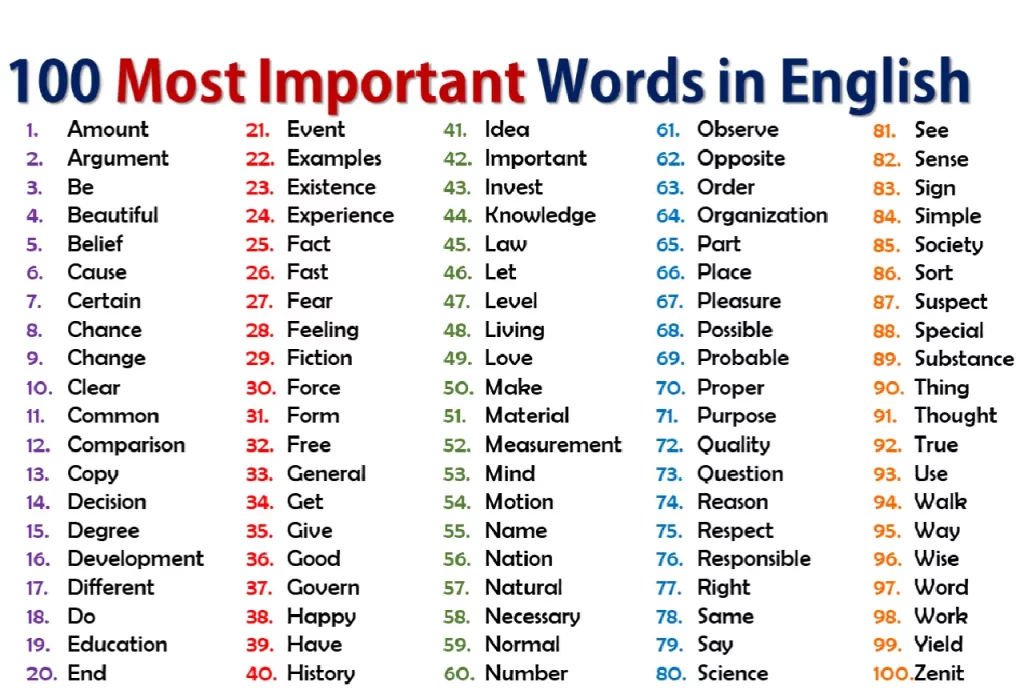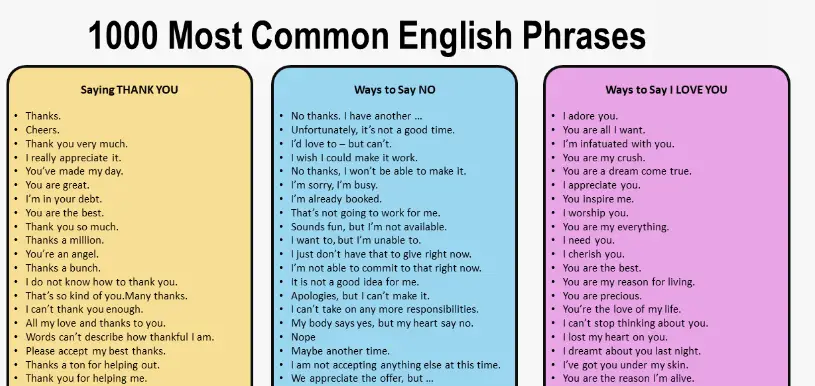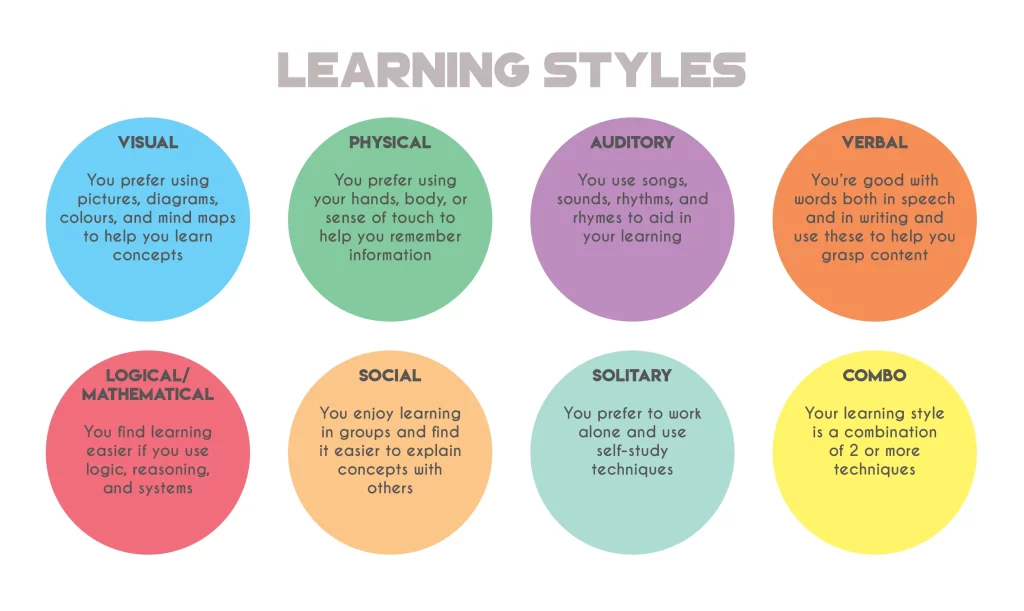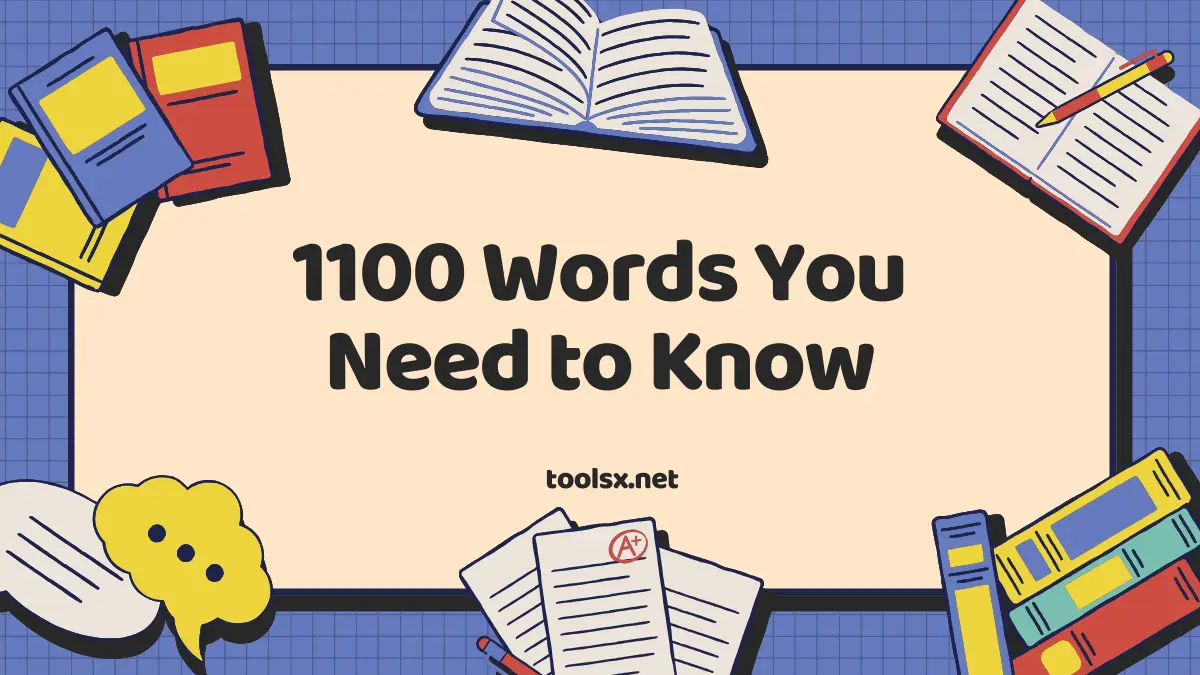In an era where communication stands as the cornerstone of success, both in personal growth and professional advancement, the power of an expansive vocabulary cannot be overstated. Whether it’s articulating thoughts more clearly, understanding complex materials, or making a lasting impression, the words we choose can open doors to new opportunities and foster deeper connections. This article delves into the essence of the renowned “1100 Words You Need to Know” – a treasure trove for those on a quest to refine their linguistic arsenal. With a focus on enhancing your vocabulary, this guide not only aims to enrich your word bank but also to illuminate the path to becoming more articulate, knowledgeable, and confident in your verbal and written endeavors.
Introduction to Vocabulary Building

The quest for an enriched vocabulary is akin to embarking on an adventure in a vast and vibrant linguistic landscape. At the heart of this journey is the 1100 Words You Need to Know, a beacon for those aspiring to elevate their command of the English language. But why, one might wonder, is such a pursuit of paramount importance?
Imagine, if you will, a world where your words wield the power to move mountains – metaphorically speaking, of course. Where every conversation, every written word, resonates with clarity, precision, and eloquence. This is not just a dream but a tangible goal that begins with understanding the indispensable role of a robust vocabulary in our daily lives.
A well-stocked arsenal of words does more than just polish your resume or boost your scores on standardized tests. It’s about bridging gaps, breaking down barriers, and painting pictures so vivid that they captivate the mind’s eye. Whether it’s weaving tales that tug at the heartstrings or arguing a case with the finesse of a seasoned lawyer, the right words at the right time can indeed make all the difference.
Yet, for many, the road to vocabulary enhancement is fraught with detours and dead ends. Where does one begin? How does one sift through the endless sea of words to find those gems that truly matter? Enter 1100 Words You Need to Know – your compass in the lexical wilderness. This guide is not merely a list but a ladder to climb the heights of effective communication and understanding.
How “1100 Words You Need to Know” Enhances Your Vocabulary
Diving into the 1100 Words You Need to Know is akin to setting sail on the vast ocean of the English language, with each word acting as a beacon guiding you towards linguistic proficiency. This segment illuminates the mechanics behind this treasure trove and the manifold benefits it bestows upon its diligent explorers.
Understanding the Basics

At its core, 1100 Words You Need to Know is more than just a collection of terms; it’s a meticulously crafted expedition designed to enhance your vocabulary in a structured, engaging manner. Each word is not merely presented but woven into a tapestry of learning that includes definitions, pronunciations, usage examples, and even etymological insights, providing a holistic understanding of its application and significance.
The beauty of this compilation lies in its diversity, encompassing a wide array of words that are pivotal across various domains, from academic texts to the realm of professional communication. It’s a bridge between the mundane and the profound, offering a gateway to express oneself with greater depth, clarity, and precision.
Benefits of Expanding Your Vocabulary
The journey of vocabulary expansion is laden with rewards, each more enriching than the last. As your lexical repository grows, so does your ability to navigate the intricacies of the English language with ease and confidence.
- Improves Reading Comprehension: A rich vocabulary turns the often daunting task of deciphering complex texts into a delightful exploration, enabling you to grasp nuances and underlying themes with minimal effort. It’s like unlocking a secret code that reveals the treasures hidden within the written word.
- Enhances Communication Skills: With an arsenal of well-chosen words at your disposal, you can articulate thoughts and ideas more effectively, tailoring your language to suit the context and audience. This not only elevates your spoken and written communication but also fosters more meaningful interactions.
- Boosts Academic and Professional Performance: Whether you’re penning an academic paper or crafting a business proposal, the right words can make your argument more compelling and your narrative more engaging. It’s the difference between making an impression and leaving a lasting impact.
Embarking on the voyage with 1100 Words You Need to Know is not just about adding entries to your vocabulary ledger; it’s about unlocking the full potential of your linguistic capabilities. It’s a transformative journey that reshapes how you perceive and interact with the world through the lens of language.
As we continue to navigate the waters of vocabulary enhancement, the subsequent sections will delve deeper into the unique features of the 1100 Words You Need to Know approach, offering insights into the practical applications of these words in both academic and professional contexts. The voyage is far from over; indeed, it has only just begun.
Key Features of the “1100 Words You Need to Know” Approach
Diving deeper into the essence of 1100 Words You Need to Know, it’s clear that this isn’t just any vocabulary list. It’s a well-thought-out plan, a strategy meticulously crafted to ensure that every learner not only encounters new words but truly absorbs and understands them. Let’s peel back the layers and explore the key features that make this approach a beacon for vocabulary enrichment.
Weekly Plan Breakdown
At the core of 1100 Words You Need to Know lies a structured, systematic approach designed to maximize learning without overwhelming the reader. Imagine, if you will, a weekly plan where each day introduces a manageable set of words, complete with definitions, usage examples, and quizzes to test your mastery. This isn’t just about rote memorization; it’s about weaving these words into the very fabric of your daily life.
Each week centers around a theme, a thread that ties the words together, making them easier to remember. It’s one thing to memorize a list of words in isolation, but to see them connected, used in context, creates a tapestry of language that is both beautiful and functional. From the world of art to the intricacies of science, these themes serve as a backdrop against which the words come to life, painting pictures in your mind that are as vivid as they are memorable.
Learning Techniques

But how, exactly, does 1100 Words You Need to Know ensure that these words stick, that they become a part of your active vocabulary rather than fading into the background? The answer lies in the innovative learning techniques employed throughout the guide.
- Usage of Mnemonics: Mnemonics, or memory aids, turn the learning process into a puzzle, a game where each word is linked to an image, a phrase, or a concept that’s easy to recall. It’s the difference between trying to remember a random sequence of letters and associating a word with something familiar, something that sticks.
- Contextual Learning Through Sentences: Each word is presented not just with its definition but in a sentence, a real-life scenario where it takes center stage. This approach bridges the gap between knowing a word and knowing how to use it, reinforcing not just its meaning but its role in communication.
- Incorporating Synonyms and Antonyms: Understanding a word fully means knowing not just what it means but also what it doesn’t mean. By exploring synonyms and antonyms, learners gain a 360-degree view of each word, a deep comprehension that enriches their language and sharpens their understanding.
This combination of structured planning and engaging learning techniques forms the backbone of the 1100 Words You Need to Know approach, a methodology that respects the complexity of language and the capacity of the human mind. It’s a journey through the world of words that promises growth, challenge, and, above all, the joy of discovery.
Practical Applications of Learned Words
Embarking on the journey of expanding your vocabulary with 1100 Words You Need to Know is not just an academic exercise; it’s a practical upgrade to your communication toolkit. Understanding the power of words and how to wield them effectively opens up a world of opportunities. Let’s explore how these newly acquired words can be applied in both academic settings and professional scenarios, enhancing your ability to express complex ideas with precision and clarity.
In Academic Settings
The academic arena is a battleground where ideas compete, and the strongest, clearest, and most compelling arguments triumph. Here, your vocabulary serves as both sword and shield, empowering you to articulate nuanced thoughts and dissect complex concepts with ease. Whether you’re crafting a persuasive essay, engaging in classroom debates, or preparing a research paper, each word you deploy can add depth and dimension to your arguments.
For students, the benefits of a rich vocabulary extend beyond the classroom walls, reaching into the realm of standardized tests such as the SAT, ACT, or GRE. These tests often assess your ability to understand and use a broad range of words, and being familiar with the 1100 Words You Need to Know can give you a significant edge. It’s not just about recognizing the words; it’s about understanding their connotations, their nuances, and how they can be used to convey your thoughts with precision and elegance.
In Professional Scenarios
The professional world, with its reports, presentations, and negotiations, demands clarity, persuasion, and impact—qualities that are directly influenced by your command of language. A well-chosen word can change the tone of a meeting, the direction of a discussion, or the outcome of a negotiation. It can make your communications more persuasive, your reports more compelling, and your presentations more engaging.
In fields such as law, journalism, marketing, and education, where communication is key, a robust vocabulary not only enhances your ability to express ideas but also builds credibility and authority. It sets you apart as someone who is articulate, well-informed, and capable of conveying complex ideas with ease and confidence.
Moreover, in today’s globalized work environment, where emails and virtual meetings transcend geographical boundaries, your words are often the primary means by which colleagues and clients form their impressions of you. A rich vocabulary enables you to craft messages that are clear, professional, and nuanced, reflecting your competence and attention to detail.
In conclusion, the practical applications of the words learned through 1100 Words You Need to Know are vast and varied, touching every aspect of your academic and professional life. They empower you to communicate more effectively, think more critically, and express yourself more creatively, opening doors to new opportunities and facilitating personal and professional growth.
FAQs
As we continue our exploration of 1100 Words You Need to Know, it’s natural to encounter questions about the best ways to integrate these new words into our vocabulary effectively. Here, we’ll address some of the most common inquiries, providing insights and strategies to help you make the most of this valuable resource.
What is the best way to memorize the “1100 Words You Need to Know”?
Memorizing the 1100 Words You Need to Know goes beyond mere repetition; it requires engagement and context. Start by incorporating these words into your daily conversations and written communications, even if it means stepping out of your comfort zone. Create flashcards, use them in sentences, and associate each word with a memorable context or story. Apps and online platforms like Quizlet flashcards for ‘1100 Words You Need to Know’ offer flashcards and games that make learning fun and interactive, turning memorization into an enjoyable part of your daily routine.
How can I track my progress with this vocabulary list?
Tracking your progress is crucial for staying motivated and recognizing the strides you’ve made. Keep a journal or a digital document where you note down each word, its definition, and a sentence using it in context. Regularly review this document and challenge yourself to use these words in new sentences. Additionally, self-assessment quizzes or discussing the words with friends or study groups can provide feedback on your understanding and retention.
Are there any digital resources or apps to complement this study?
Yes, numerous digital resources and apps can complement your study of 1100 Words You Need to Know. Beyond the aforementioned Quizlet, platforms like Cambridge Dictionary Online for word definitions and usage examples offer definitions, pronunciations, and examples that can deepen your understanding of each word.
In wrapping up this section, it’s evident that questions around vocabulary building are as diverse as the learners themselves. Yet, at the core of each answer lies a commitment to active engagement, regular practice, and a curiosity that drives us to explore the depths of the English language. With 1100 Words You Need to Know as your guide, the journey to a richer vocabulary is not just achievable but also a rewarding adventure in personal and professional growth.
Conclusion and Encouragement to Start
As we draw our exploration of 1100 Words You Need to Know to a close, it’s clear that the journey we’ve embarked on is much more than a quest for a richer vocabulary. It’s a pathway to unlocking new dimensions of expression, understanding, and connection. This exploration has not only illuminated the practical applications and transformative power of an expanded lexicon but also highlighted the joy and fulfillment that come from engaging deeply with language.
Embracing the 1100 Words You Need to Know is not merely about memorizing a list of words; it’s about opening doors to new ideas, cultures, and perspectives. It’s about enhancing your ability to communicate with clarity, nuance, and creativity. Each new word is a tool for building bridges, crafting stories, and articulating dreams. In the tapestry of human connection, your words are the threads that weave together understanding and empathy.
As you stand on the brink of this linguistic adventure, remember that every great journey begins with a single step. The path to a more expansive vocabulary is paved with curiosity, perseverance, and a willingness to explore. There will be challenges along the way, words that twist your tongue and concepts that stretch your mind, but the rewards are boundless. With each new word, you’ll find yourself more capable of expressing complex ideas, more attuned to the subtleties of language, and more connected to the world around you.
Remember, the power of words transcends the pages of any book; it resides in the minds and hearts of those who wield them. Let 1100 Words You Need to Know be your guide, but let your passion for language chart the course. Here’s to the adventures that await and the stories yet to be told. Your journey begins now.

